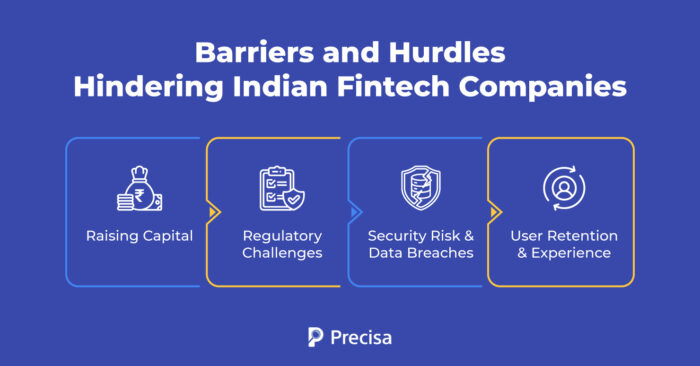4 Major Challenges Faced By Fintech Companies in India

India is presently undergoing tech-led transformation, driving digitisation across key sectors such as manufacturing, healthcare, transport, agriculture, and finance. Among these, the financial technology (fintech companies) sector has emerged as a particularly dynamic force.
With strong government backing and a surge in fintech innovation, India today hosts the third-largest fintech ecosystem globally. Valued at $31 billion in 2021, the Indian fintech market is expected to cross the $2 trillion mark by 2030, according to industry projections.
However, this meteoric growth is not without its hurdles. Fintech companies in India must navigate a complex set of challenges to not just grow, but to survive. This blog post highlights the most pressing issues facing the industry today.
Barriers and Hurdles Hindering Indian Fintech Companies
From intense competition, economic fluctuations, and regulatory challenges to infrastructure challenges, fintech companies are navigating a maze of unfavourable obstacles to compete and survive. Let’s look at some of the most significant roadblocks:
1. Raising Capital
Capital remains the lifeblood of any fintech venture, essential for scaling operations, enhancing technology, and staying competitive. However, raising capital in today’s environment is increasingly challenging.
Inc42 Plus Fintech Report 2024 notes that the global “funding winter” that began in 2022 has made investors more cautious, with Indian fintech funding dropping by 42% in 2023 compared to the previous year.
Investors now demand more detailed due diligence, profitability roadmaps, and long-term resilience plans before committing capital. In a crowded market, securing the right investor requires precision, transparency, and strategic clarity.
2. Regulatory Challenges
India is currently home to 26 unicorns (including one decacorn), and it has seen a five-fold increase in fintech companies to 10,200 in the last three years.
Despite India being at the forefront of fintech innovation, regulatory uncertainty continues to pose serious challenges. Fintechs operate under a complex matrix of regulatory bodies — RBI, SEBI, IRDAI, NPCI — each with overlapping jurisdiction.
Key regulations affecting fintech operations include:
- Master Directions for NBFC-P2P Lending Platforms (2017)
- IT Act (2000) and amendments
- Digital Personal Data Protection Act (2023)
- Payment and Settlement Systems Act (2007)
Frequent regulatory changes create ambiguity over which laws apply to different fintech business models. The absence of a single, comprehensive fintech regulatory framework in India amplifies compliance costs and operational risks.
3. Security Risk and Data Breaches
Fast-paced innovation, government endorsements for fintech initiatives like the UPI, and an exponential rise in smartphone usage have laid the foundations for a robust, dynamic fintech ecosystem. As mentioned earlier, despite these promising and encouraging signs, security risks and data breaches are becoming a huge concern in the present scheme of things.
The availability of large volumes of data in digital formats has accelerated the need to secure sensitive customer data from cyberattacks and other forms of digital threats. Additionally, as more and more consumers embrace digital financial tools and services, there is a growing need to establish and preserve consumer trust.
UPI-related frauds surged to 13.42 lakh incidents in FY 2023-24, causing losses over ₹1,087 crore, a significant rise from the previous year’s 7.25 lakh cases. Such security, privacy, and data breaches tarnish the reputation and credibility of a fintech company, resulting in a loss of trust in the highly competitive sector.
4. User Retention and Experience
Acquiring users is only the first step — retaining them is the true test of fintech companies’ success.
According to Adjust’s Mobile App Trends Report 2023, 73% of new app users globally churn within the first seven days of installation. The Indian fintech ecosystem mirrors this trend, underscoring the need to focus on continuous engagement.
Offering a seamless, personalised user experience should be done through:
- Social-driven interactions
- Targeted push notifications
- Data-driven service personalisation
This can dramatically improve retention rates. Fintechs that treat user engagement as an ongoing relationship rather than a one-time transaction are more likely to build enduring brands.
Wrapping It Up
India’s fintech ecosystem is evolving at an extraordinary pace. Yet, for all the opportunities, the challenges are equally formidable.
Between navigating complex regulations, securing funding in a cautious market, ensuring airtight data security, and mastering user retention, fintech companies must operate with both agility and resilience to thrive.
Precisa empowers fintechs and BFSI players to meet these challenges head-on. Our cloud-based financial data analytics solutions enable clients to:
- Automate bank statement analysis
- Strengthen early warning systems
- Detect cash flow risks and transaction anomalies
- Enhance customer onboarding and risk scoring
With Precisa, you gain a trusted technology partner committed to improving operational efficiency, risk management, and customer satisfaction.
Book a demo to see how Precisa can help transform your financial decision-making.




